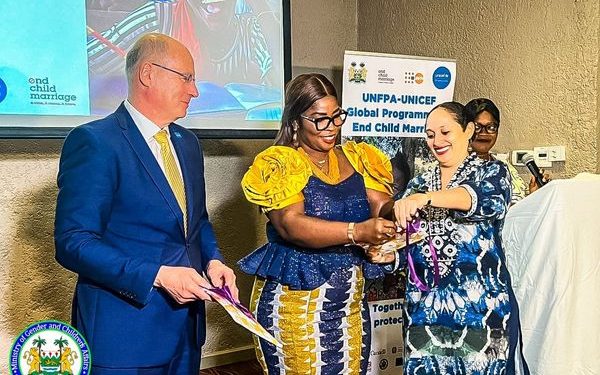The Minister of Gender and Children’s Affairs, Dr. Isata Mahoi, delivered a keynote address today at the official launch of the third phase of the UNFPA-UNICEF Global Programme to End Child Marriage. The event, which took place at the Radisson Blu Hotel, was held under the theme “Prohibition of Child Marriage Act” and came on the heels of Sierra Leone’s enactment of the Child Marriage Prohibition Act, 2024. The program saw high-level attendance from critical stakeholders, including representatives from UNICEF, UNFPA, the UK government, ministers, and other dignitaries.
In her address, Dr. Mahoi commended the Government of Sierra Leone for its steadfast commitment to addressing child marriage through the Sustainable Development Goals (SDGs), specifically SDG 5, which focuses on gender equality. “I stand here to honor not only the government of Sierra Leone but every girl child, every family, and every community affected by this pervasive issue,” Dr. Mahoi said.
The Minister highlighted Sierra Leone’s significant strides in reducing child marriage from 48 percent in 2008 to 30 percent in 2019. However, she stressed that much more needs to be done, as one in every three adolescent girls is still at risk of being forced into early marriage. She expressed confidence that the newly passed Child Marriage Prohibition Act, which criminalizes the marriage of anyone under the age of 18, would be a powerful tool in reducing these alarming rates.
Dr. Mahoi also praised Her Excellency, the First Lady Fatima Bio, for her groundbreaking “Hands Off Our Girls” campaign and acknowledged the vital role that parliament played in enacting the Child Marriage Prohibition Act, which she said reflects the Government’s broader strategy to protect and uplift children across the nation. “It is a commitment to change the narrative, to ensure that every girl child has the right to choose her path,” the Minister remarked.
The program’s keynote address underscored the ministry’s framework, which includes enhancing access to gender-responsive child protection services, strengthening adolescent-friendly sexual and reproductive health services, and rolling out the Gender-Based Violence Information Management System (GBVIMS).
It also includes a digital referral pathway to ensure confidentiality and support for abuse survivors.
The Minister expressed her gratitude to both UNFPA and UNICEF for their unwavering dedication to empowering young girls and called for continued collaboration between the United Nations and the Government of Sierra Leone to ensure the sustainability of the program’s efforts. She urged stakeholders to intensify community-based initiatives, youth-led actions, and educational investments, emphasizing the need to change social attitudes toward child marriage.
Dr. Mahoi concluded by formally launching the third phase of the Global Programme to End Child Marriage, stating, “It is now my singular honor to declare the third phase of the UNFPA-UNICEF Global Programme to Accelerate Action to End Child Marriage officially launched.”
The launch marks a significant milestone in Sierra Leone’s efforts to eradicate child marriage and protect the rights of every girl child. The program’s third phase will focus on enforcing existing laws, empowering girls through education, and working closely with communities to shift cultural norms and attitudes toward early marriage.
The Minister thanked all officials and partners who attended the event and urged them to continue supporting initiatives to end child marriage in Sierra Leone.
Credit: SLENA










